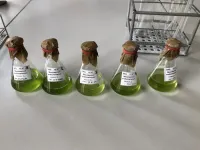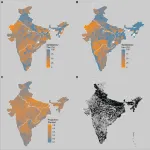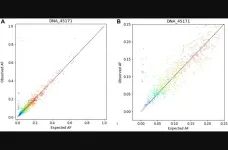(Press-News.org) CHAMPAIGN, Ill. — Food was used as both a weapon and a tool of resistance in the Mississippi Delta during the Civil Rights Movement.
Bobby J. Smith II, an African American studies professor at the University of Illinois Urbana-Champaign, looked at how the Civil Rights Movement expanded to include struggles around food in his book “Food Power Politics: The Food Story of the Mississippi Civil Rights Movement.” The book is the inaugural title in the Black Food Justice series by the University of North Carolina Press.
Smith wrote about how white economic and political actors turned access to food into a weapon against poor, rural Black communities, and how those communities in turn created their own local food economy. The story provides historical context for today’s struggles around issues of food security, food access, food justice and what the U.S. Department of Agriculture calls “food deserts,” he said.
The book also talks about an aspect of the Civil Rights Movement that has been overlooked. Lunch counter protests and demonstrations over voting rights, education and access to public accommodations are well-known. But poor, rural residents were resisting oppression in their everyday lives through food, Smith said.
“Food is not just something on our plate or in the grocery store. There is power in the way food is moved throughout the world,” he said.
Smith’s research focused on the Yazoo-Mississippi Delta, comprising 18 counties in an agricultural region in the western part of the state. This part of rural Mississippi is one of the poorest places in the state, which is the most food insecure state in the nation, as well as one of the unhealthiest, with high rates of diabetes, heart disease and hypertension, Smith said. Additionally, Mississippi is both the birthplace of organized white supremacy and the site of robust Black activism, he said.
The use of food as a weapon against Black people began with slavery, when plantation masters withheld food to starve slaves into compliance, Smith said. Later, sharecroppers could only get food through the plantation commissary or federal food programs when they were prohibited from growing it themselves. More recently, food was weaponized through federal food policies and programs, he said.
Smith wrote about the 1962-63 Greenwood Food Blockade, when the all-white board of supervisors in the Delta county of Leflore eliminated its participation in the federal surplus commodities program, which provided free food to poor communities, in response to a voter registration campaign.
“It was taken away as a form of voter suppression. Food was used as a political weapon,” Smith said.
In response, activists organized a massive, multistate food network to provide food to the people who had depended on the surplus commodities program. They were able to eventually get the federal program reinstated, and the blockade “ended up being the catalyst for one of the most successful voter registration efforts in the state of Mississippi and across the South,” Smith said.
Food also was used as an economic weapon through the federal food stamp program. White grocery store owners influenced the passage of the food stamp program because residents who were getting free food through the commodities program were not shopping at grocery stores. The grocers got a provision written into the program barring counties who offered food stamps from also offering the commodities program, Smith said.
“They were attempting to shift how poor people accessed food. It was not about feeding the poor. It was about making money,” he said.
Grocery store owners could extend credit for food stamps, further indebting the poor who were using them, and they regulated what items could be purchased with food stamps and raised the prices of those items, Smith said.
Black residents created a local food economy – the North Bolivar County Farm Cooperative – that included farms, 12 cooperative grocery stores and a transportation system. The cooperative provided work as well. At the time, the plantation economy was collapsing as machines replaced human labor, and many people didn’t have jobs, Smith said.
“The food system and local food economy was not only feeding them; it was also providing economic security. It provided the blueprint for the food justice movement today,” he said.
Smith used the term “emancipatory food power” for such efforts to shift who controls when, where and how people can access food.
In his last chapter, Smith wrote about a contemporary food justice movement by rural Black youth, the North Bolivar County Good Food Revolution, formed in the same location as the farm cooperative 50 years earlier. The new movement builds on the past in looking at inequities in food access and pays particular attention to access to nutritious food as an intervention to reduce diet-related illnesses in the region, Smith said. The organization includes a farm, a mobile produce market and a cooking demonstration program that shows how to prepare food in healthful ways.
“Inequality still exists but they frame it differently. It’s not just about trying to survive. Now they are calling into question the structures that shape the inequalities. What are the structures in place that are creating conditions why people are hungry?” Smith said. “I want us to reframe the conversation about food.”
END
Illinois professor examines the overlooked role of food in civil rights struggle
African American studies professor Bobby J. Smith II tells how food was used as a weapon and a tool of resistance during the Civil Rights Movement in his book “Food Power Politics: The Food Story of the Mississippi Civil Rights Movement."
2023-08-30
ELSE PRESS RELEASES FROM THIS DATE:
How nutrition guidance can optimize fertility treatments for female cancer survivors
2023-08-30
A cancer diagnosis can increase the risk of infertility in young women. While consuming a healthy diet – including whole grains, fruits, vegetables, and healthy fatty acids – has been found to improve both fertility and cancer survivorship, over 90% of young adult cancer survivors don’t meet the dietary recommendations and have diets consisting of high fat and low fruit and vegetable intake. Researchers from Drexel University’s College of Nursing and Health Professions explored the barriers and ways to promote healthy diet practices among female cancer survivors with fertility challenges.
Recently ...
Algae provide clues about 600 million years of plant evolution
2023-08-30
The Earth's surface is covered by plants. They make up the majority of biomass on land and exhibit a wide range of diversity, from mosses to trees. This astounding biodiversity came into existence due to a fateful evolutionary event that happened just once: plant terrestrialization. This describes the point where one group of algae, whose modern descendants can still be studied in the lab, evolved into plants and invaded land around the world. An international group of researchers, spearheaded by a team from the University of Göttingen, generated large ...
Editorial: Epigenetic aging in oocytes
2023-08-30
“In summary, our group demonstrates basic principles in the early aging of mammalian oocytes.”
BUFFALO, NY- August 30, 2023 – A new editorial paper was published in Aging (listed by MEDLINE/PubMed as "Aging (Albany NY)" and "Aging-US" by Web of Science) Volume 15, Issue 15, entitled, “Epigenetic aging in oocytes.”
Aging-related phenotypes span many different tissues and cell types, and start to occur at different ages - a different typical age for every cell type. In their new editorial, researchers Peera Wasserzug-Pash and Michael ...
Can taking statins after a bleeding stroke lower risk of another stroke?
2023-08-30
MINNEAPOLIS – People who have had a stroke called an intracerebral hemorrhage who take cholesterol-lowering drugs called statins may have a lower risk of having another stroke, especially ischemic stroke, compared to people who also had an intracerebral hemorrhage but were not taking statins, according to a new study published in the August 30, 2023, online issue of Neurology®, the medical journal of the American Academy of Neurology.
Intracerebral hemorrhage is caused by bleeding in the brain. Ischemic stroke is caused by a blockage of blood flow to the brain and is the most common type of stroke.
“Previous research has had mixed results on the risk of ...
Stanford-led study reveals way to help prevent childhood stunting
2023-08-30
A relatively small intervention could have a huge impact on a damaging condition that stalks children in the developing world. A new Stanford-led study shows that adding zinc to farmland soil can help prevent childhood stunting, a condition due to chronic undernutrition that is associated with poor brain development and long-lasting harmful consequences, such as reduced school performance and increased disease risks. The paper, published Aug. 21 in Scientific Reports is the first large-scale study to examine the association between children’s nutritional status or health outcomes and soil mineral availability in India, ...
Validation of a comprehensive genomic profiling assay: NeXT Dx™
2023-08-30
“NeXT Dx incorporates a range of features and comprehensive genome variant detection methods that lead to improved disease management and possible enhanced clinical utility.”
BUFFALO, NY- August 30, 2023 – A new research paper was published in Oncotarget's Volume 14 on August 30, 2023, entitled, “Analytic validation of NeXT Dx™, a comprehensive genomic profiling assay.”
In this new research paper, researchers Juan-Sebastian Saldivar, Jason Harris, Erin Ayash, Manqing Hong, Prateek Tandon, Saloni Sinha, Patricia Miranda Hebron, Erin E. Houghton, ...
UC Davis names Blake Meyers as new Genome Center director
2023-08-30
Blake Meyers, a principal investigator at the Donald Danforth Plant Science Center and a professor of plant sciences from the University of Missouri - Columbia, has been named the new director and Novozymes Chair in Genomics at the UC Davis Genome Center. Meyers, who studies plant RNA biology, bioinformatics and functional genomics, will step into the role on March 1.
A member of the National Academy of Sciences, Meyers succeeds the center’s founding director Richard Michelmore, a distinguished professor in the departments of Plant Sciences, Molecular and Cellular Biology, and Medical Microbiology and Immunology.
Roots ...
NASA to demonstrate laser communications from space station
2023-08-30
NASA uses the International Space Station — a football field-sized spacecraft orbiting Earth — to learn more about living and working in space. For over 20 years, the space station has provided a unique platform for investigation and research in areas like biology, technology, agriculture, and more. It serves as a home for astronauts conducting experiments, including advancing NASA’s space communications capabilities.
In 2023, NASA is sending a technology demonstration known as the Integrated LCRD Low Earth Orbit User ...
Educational attainment protects against a genetic risk factor for Alzheimer’s disease
2023-08-30
A new study by researchers from Mass General Brigham further illustrates that when it comes to risk of Alzheimer’s disease, even genetically determined forms of the disease, genetics is only one piece of the puzzle. Researchers investigated the influence of genetics and educational attainment on cognitive decline by studying data from 675 people who carry a mutation that predisposes them to early onset Alzheimer’s disease. Carriers of this mutation—known as PSEN1 E280A—have a median age of 49 for onset of dementia. The team found that among ...
Virtual institute at the University of Kansas to combat cyber threats
2023-08-30
LAWRENCE, KANSAS — A new virtual institute established at the University of Kansas School of Engineering will train the next generation of military and civilian leaders to better combat the growing threat of cyberattacks and protect the electromagnetic spectrum (EMS).
KU received a two-year, $1.5 million grant from the Department of Defense to establish the program, known as the Virtual Institutes for Cyber and Electromagnetic Spectrum Research and Employ, or VICEROY, Virtual Institute. The grant is overseen by the Griffiss Institute, which is a nonprofit talent ...
LAST 30 PRESS RELEASES:
Striking genomic architecture discovered in embryonic reproductive cells before they start developing into sperm and eggs
Screening improves early detection of colorectal cancer
New data on spontaneous coronary artery dissection (SCAD) – a common cause of heart attacks in younger women
How root growth is stimulated by nitrate: Researchers decipher signalling chain
Scientists reveal our best- and worst-case scenarios for a warming Antarctica
Cleaner fish show intelligence typical of mammals
AABNet and partners launch landmark guide on the conservation of African livestock genetic resources and sustainable breeding strategies
Produce hydrogen and oxygen simultaneously from a single atom! Achieve carbon neutrality with an 'All-in-one' single-atom water electrolysis catalyst
Sleep loss linked to higher atrial fibrillation risk in working-age adults
Visible light-driven deracemization of α-aryl ketones synergistically catalyzed by thiophenols and chiral phosphoric acid
Most AI bots lack basic safety disclosures, study finds
How competitive gaming on discord fosters social connections
CU Anschutz School of Medicine receives best ranking in NIH funding in 20 years
Mayo Clinic opens patient information office in Cayman Islands
Phonon lasers unlock ultrabroadband acoustic frequency combs
Babies with an increased likelihood of autism may struggle to settle into deep, restorative sleep, according to a new study from the University of East Anglia.
National Reactor Innovation Center opens Molten Salt Thermophysical Examination Capability at INL
International Progressive MS Alliance awards €6.9 million to three studies researching therapies to address common symptoms of progressive MS
Can your soil’s color predict its health?
Biochar nanomaterials could transform medicine, energy, and climate solutions
Turning waste into power: scientists convert discarded phone batteries and industrial lignin into high-performance sodium battery materials
PhD student maps mysterious upper atmosphere of Uranus for the first time
Idaho National Laboratory to accelerate nuclear energy deployment with NVIDIA AI through the Genesis Mission
Blood test could help guide treatment decisions in germ cell tumors
New ‘scimitar-crested’ Spinosaurus species discovered in the central Sahara
“Cyborg” pancreatic organoids can monitor the maturation of islet cells
Technique to extract concepts from AI models can help steer and monitor model outputs
Study clarifies the cancer genome in domestic cats
Crested Spinosaurus fossil was aquatic, but lived 1,000 kilometers from the Tethys Sea
MULTI-evolve: Rapid evolution of complex multi-mutant proteins
[Press-News.org] Illinois professor examines the overlooked role of food in civil rights struggleAfrican American studies professor Bobby J. Smith II tells how food was used as a weapon and a tool of resistance during the Civil Rights Movement in his book “Food Power Politics: The Food Story of the Mississippi Civil Rights Movement."








